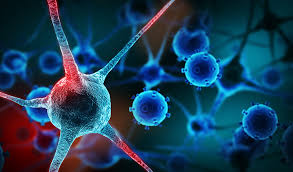
A new study by Swedish scientists claim that cancer can be fought by a new tool that they have identified - small molecules which have the specific property of restraining a selenium-containing enzyme within the human body. These molecules were used for treatment of 60 varied types of cancer cells under laboratory conditions and the results were found to be effective, said the scientists.
Very fast and quick killing effect of cancerous tumor cells with these molecules were noticed in mice that had cancer in the study, the results of which were published on Wednesday in the US medical journal Science Translational Medicine. The study was done by researchers at Karolinska Institute in Sweden.
The scientists engage in the experiments are hopeful that the results of the study and the approach to the fight against cancer can also be extended to be applied on humans. Selenium is a chemical element that is an essential micronutrient. Growth of various types of cells is possible as well as protecting them from oxidative effects is possible with the help of a selenium-containing enzyme which is known as TrxR1.
Oxidative stress is essentially the medical term that is used to describe an imbalance in the production of free radicals that are very reactive with other molecules and the capability of the body to fight or to repair the damage that results from the reactions. However, increased levels of TrxR1 could be detected in a number of cancer forms. TrxR1 is also linked to worse cases of in head and neck, lung and breast cancers.
Very quick tumouricidal effects were detected in the treatment of head and neck or breast cancers in mice by the researchers while there were every little side effects.
In their search for molecules that would be able to control TrxR1 more specifically, researchers conducted analysis of nearly 400,000 varied molecules. They were able to identify three different types of molecules which turned out to be useful for anti-cancer medicines.
“This effectiveness against cancer may be a result of cancer cells’ seemingly greater sensitivity to oxidative stress when compared to normal cells, which in turn can be utilised in cancer therapy,” Elias Arner, a professor at the Karolinska Institute, who led the study, said. “This seems to work in mouse models and we are therefore hopeful that this principle for treatment can be developed for humans, even if this will require many years of further research,” he added.
The intake of selenium has been associated with cancer for a long time even though the relationship between cancer growth and selenium is very complex and is yet to be understood completely.
The researchers said that there are number of cancer medicine sin the market that already make use of inhibition of TrxR1, even though the new molecules are yet to be put through human tests.
(Source:www.indianexpress,com)
Very fast and quick killing effect of cancerous tumor cells with these molecules were noticed in mice that had cancer in the study, the results of which were published on Wednesday in the US medical journal Science Translational Medicine. The study was done by researchers at Karolinska Institute in Sweden.
The scientists engage in the experiments are hopeful that the results of the study and the approach to the fight against cancer can also be extended to be applied on humans. Selenium is a chemical element that is an essential micronutrient. Growth of various types of cells is possible as well as protecting them from oxidative effects is possible with the help of a selenium-containing enzyme which is known as TrxR1.
Oxidative stress is essentially the medical term that is used to describe an imbalance in the production of free radicals that are very reactive with other molecules and the capability of the body to fight or to repair the damage that results from the reactions. However, increased levels of TrxR1 could be detected in a number of cancer forms. TrxR1 is also linked to worse cases of in head and neck, lung and breast cancers.
Very quick tumouricidal effects were detected in the treatment of head and neck or breast cancers in mice by the researchers while there were every little side effects.
In their search for molecules that would be able to control TrxR1 more specifically, researchers conducted analysis of nearly 400,000 varied molecules. They were able to identify three different types of molecules which turned out to be useful for anti-cancer medicines.
“This effectiveness against cancer may be a result of cancer cells’ seemingly greater sensitivity to oxidative stress when compared to normal cells, which in turn can be utilised in cancer therapy,” Elias Arner, a professor at the Karolinska Institute, who led the study, said. “This seems to work in mouse models and we are therefore hopeful that this principle for treatment can be developed for humans, even if this will require many years of further research,” he added.
The intake of selenium has been associated with cancer for a long time even though the relationship between cancer growth and selenium is very complex and is yet to be understood completely.
The researchers said that there are number of cancer medicine sin the market that already make use of inhibition of TrxR1, even though the new molecules are yet to be put through human tests.
(Source:www.indianexpress,com)





